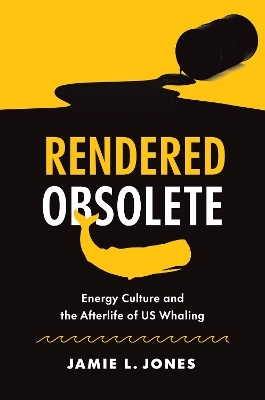
Rendered Obsolete
Energy Culture and the Afterlife of US Whaling
Seiten
2023
The University of North Carolina Press (Verlag)
978-1-4696-7482-7 (ISBN)
The University of North Carolina Press (Verlag)
978-1-4696-7482-7 (ISBN)
Analysing a vast archive that includes novels, periodicals, artifacts from whaling ships, tourist attractions, and even whale carcasses, Jones explores the histories of race, labor, and energy consumption in the nineteenth-century United States through the lens of the whaling industry’s legacy.
Through the mid-nineteenth century, the US whaling industry helped drive industrialization and urbanization, providing whale oil to lubricate and illuminate the country. The Pennsylvania petroleum boom of the 1860s brought cheap and plentiful petroleum into the market, decimating whale oil's popularity. Here, from our modern age of fossil fuels, Jamie L. Jones uses literary and cultural history to show how the whaling industry held firm in US popular culture even as it slid into obsolescence. Jones shows just how instrumental whaling was to the very idea of "energy" in American culture and how it came to mean a fusion of labor, production, and the circulation of power. She argues that dying industries exert real force on environmental perceptions and cultural imaginations.
Analyzing a vast archive that includes novels, periodicals, artifacts from whaling ships, tourist attractions, and even whale carcasses, Jones explores the histories of race, labor, and energy consumption in the nineteenth-century United States through the lens of the whaling industry's legacy. In terms of how they view power, Americans are, she argues, still living in the shadow of the whale.
Through the mid-nineteenth century, the US whaling industry helped drive industrialization and urbanization, providing whale oil to lubricate and illuminate the country. The Pennsylvania petroleum boom of the 1860s brought cheap and plentiful petroleum into the market, decimating whale oil's popularity. Here, from our modern age of fossil fuels, Jamie L. Jones uses literary and cultural history to show how the whaling industry held firm in US popular culture even as it slid into obsolescence. Jones shows just how instrumental whaling was to the very idea of "energy" in American culture and how it came to mean a fusion of labor, production, and the circulation of power. She argues that dying industries exert real force on environmental perceptions and cultural imaginations.
Analyzing a vast archive that includes novels, periodicals, artifacts from whaling ships, tourist attractions, and even whale carcasses, Jones explores the histories of race, labor, and energy consumption in the nineteenth-century United States through the lens of the whaling industry's legacy. In terms of how they view power, Americans are, she argues, still living in the shadow of the whale.
Jamie L. Jones is assistant professor of English at the University of Illinois at Urbana-Champaign.
| Erscheinungsdatum | 26.08.2023 |
|---|---|
| Zusatzinfo | 15 halftones |
| Verlagsort | Chapel Hill |
| Sprache | englisch |
| Maße | 155 x 235 mm |
| Gewicht | 272 g |
| Themenwelt | Geisteswissenschaften ► Geschichte ► Regional- / Ländergeschichte |
| Geisteswissenschaften ► Sprach- / Literaturwissenschaft ► Anglistik / Amerikanistik | |
| Geisteswissenschaften ► Sprach- / Literaturwissenschaft ► Literaturwissenschaft | |
| Technik ► Umwelttechnik / Biotechnologie | |
| ISBN-10 | 1-4696-7482-3 / 1469674823 |
| ISBN-13 | 978-1-4696-7482-7 / 9781469674827 |
| Zustand | Neuware |
| Informationen gemäß Produktsicherheitsverordnung (GPSR) | |
| Haben Sie eine Frage zum Produkt? |
Mehr entdecken
aus dem Bereich
aus dem Bereich
Erinnerungen
Buch | Softcover (2024)
Pantheon (Verlag)
CHF 22,40


